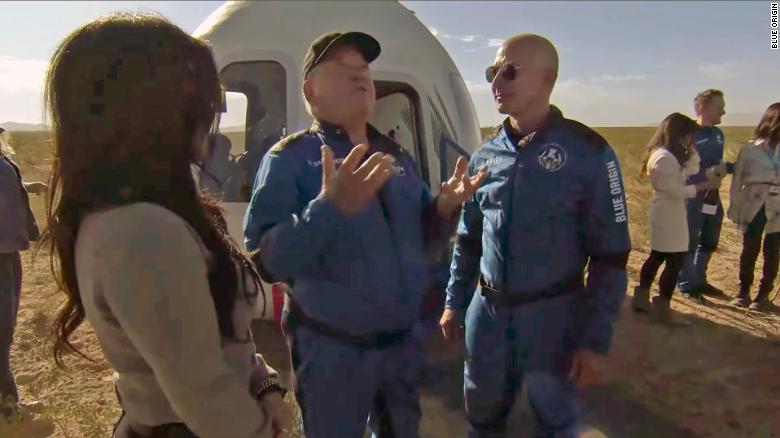MARKETS
begin quote from:
https://www.cnn.com/2021/10/14/tech/william-shatner-blue-origin-space-safety-scn/index.html
How space researchers knew that 90-year-old William Shatner didn't have to worry about his age

By Jackie Wattles, CNN Business
Updated 3:28 PM ET, Thu October 14, 2021

00:07/02:26
New York (CNN Business)William Shatner, the 90-year-old actor of "Star Trek" fame, endured a 10-minute, rocket-powered ride to the edge of space, which put his body through crushing g-forces that his fellow passengers described as face-bending — only to step out of the vehicle and immediately begin waxing poetic about the experience and dodging a champagne shower.
In that moment, at least one thing became certain: Yes, a nonagenarian can be an astronaut.
Shatner became the oldest person ever to travel to space when his vessel — a suborbital space tourism rocket built by Blue Origin, the company funded by Amazon billionaire Jeff Bezos — brushed the boundary of Earth's atmosphere and vaulted him into weightlessness. And Shatner's oldest-in-space record bested the one set only a few months earlier by Wally Funk, who was previously denied the opportunity to fly by NASA in the 1960s before she joined Bezos on a his own Blue Origin flight in July at the age of 82.
But while Shatner described the payoff of floating above the Earth as "profound," getting there isn't always the most comfortable.
Chris Boshuizen, a co-founder of satellite company Planet Labs who flew alongside Shatner, said that as their Blue Origin dove back into the Earth's thick atmosphere from the vacuum of space, it was as if they were a stone slamming into a body of water.
"When a stone hits a lake, it stops and then it sinks," Boshuizen told reporters. "So we literally hit the atmosphere and stopped, and it was about 5Gs...I've never experienced that. I was trying to smile but my jaw was pushed back in my head."
Enter your email to sign up for the Wonder Theory newsletter.
close dialog
Private space companies have pledged for years to open up spaceflight to more people. But Americans are used to imagining astronauts as people in prime physical condition, siphoned out of competitive selection processes like those overseen by NASA. So is it really safe for just anyone, even a 90-year-old, to go to space?
A series of studies in the 2010s sought to answer such question. Researchers put people with pre-existing medical conditions, including elderly men with heart conditions, into a spinning centrifuge to simulate the g-forces the body is subjected to during a trip to space.
Subjects were strapped into a small capsule attached to a massive metal arm that can swing the capsule around in a circle. That faster it spins, the higher the g-forces pressing into the passenger grow, much like the carnival rides that pin passengers to the wall of a spinning circle by rotating the circle at high speeds. When the centrifuge is stopped, passengers inside could be said to be experiencing 1G, or normal gravity on Earth.
At 2G, they feel like they weigh twice their body weight. At 5G, a 200-pound person feels like they weigh 1,000 pounds.
Donoviel pointed to three specific studies that saw people — with a broad range of ages, physical conditions and ailments — endure up to 6G.
"They were fine, they were perfectly fine," Donoviel said. "The only thing... that was of concern when they did those studies was really anxiety and definitely claustrophobia."
In one 2015 paper, researchers said as many as 14% of subjects in one experiment suffered anxiety so severe that it interfered with their ability to complete their centrifuge training. It wasn't easy to predict who might respond that way, even when pre-existing anxiety conditions were taken into account, according to the paper. The report called for more research into the area and suggested possible treatments, such as therapy and medication.
For its part, Blue Origin does put some limitations on who can fly aboard New Shepard, its suborbital space tourism rocket, including an age requirement that tourists be 18 years or older, be between 5'0" and 6'4" and 110 pounds and 223 pounds, and be in good enough physical shape to climb seven flights of stairs in a minute and a half.
The stair climb is no joke: Blue Origin passengers must rapidly climb what's called the gantry, a tower that allows the crew to access their capsule as the 60-foot-tall rocket sits on the launch pad, brimming with fuel and ready to blast off.
Shatner quipped about scaling the tower after his flight, saying "good lord, just getting up the bloody gantry."
But Donoviel said she believes even little kids could potentially be blasted into outer space without concern on an otherwise safe rocket ride.
"I actually have no concerns about children flying," she said. "As long as they're big enough to fit in the seats...The same thing as going on a rollercoaster ride — you must be this tall to ride this ride."
It should be noted that getting to — and especially returning from — space is not necessarily comfortable, though all of the Blue Origin passengers on Wednesday raved about their trip.
Spaceflight passengers often describe the moments of discomfort with nostalgic glee. After all, it can be a visceral reminder that you're on a supersonic excursion to outer space.
And in Shatner's case, it did appear to provide a transformational experience.
It's not something a person can understand until "you're up there and you see the black darkness, the ugliness," he told CNN's Kristin Fisher in a post-flight interview. "From our point of view, space is filled with mystery...but in that moment, it is blackness and death. In this moment down here, as we look down, [Earth] is life and nurturing. That's what everybody needs to know."
If the past eight months are any indicator, Shatner is far from the last civilian to experience spaceflight. So far in 2021, more than 20 people who do not list astronaut as their day job have made a trek to the so-called final frontier, and none of them proved to lack the proverbial "right stuff." (Though, it should be noted, none of them had to pilot their respective spacecrafts and most have taken only minutes-long trips to suborbital space.)
Physiological concerns aside, any future participant should keep in mind that spaceflight is inherently risky. Drumming up enough speed and power to defy gravity requires rockets to use powerful, controlled explosions and complex technology that always involves some uncertainties.





































































































No comments:
Post a Comment